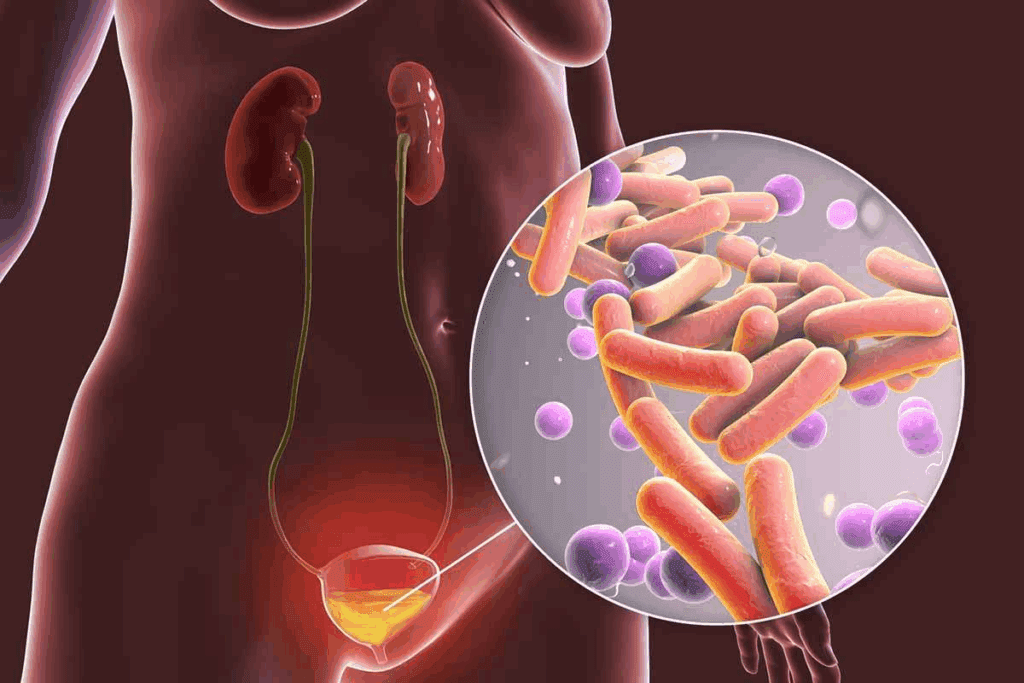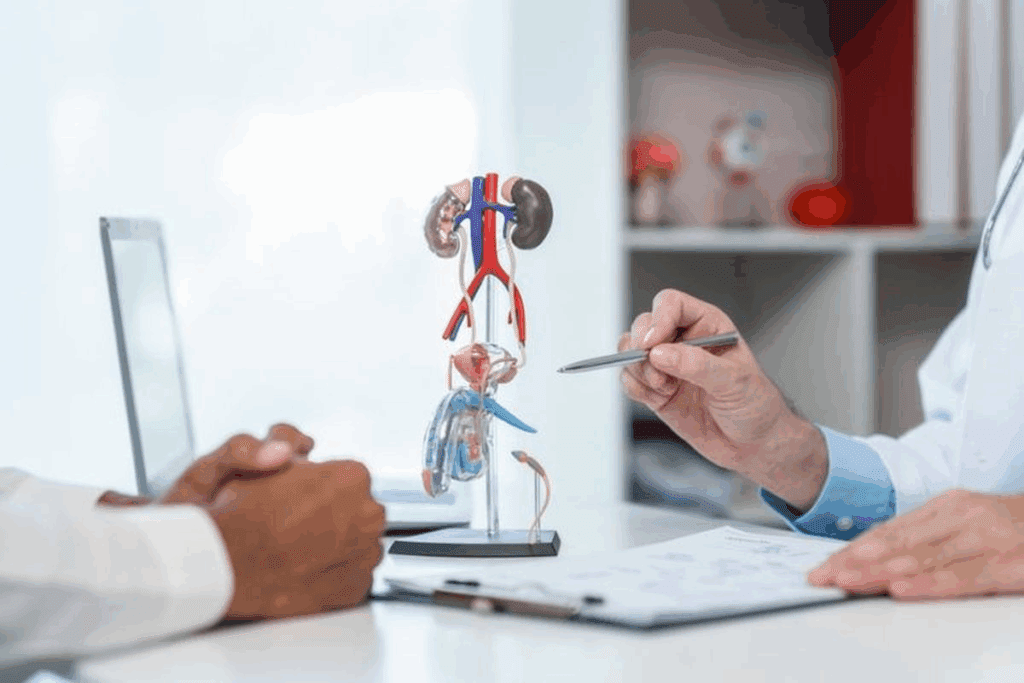
Chemotherapy is a key treatment for cancer, but it can sometimes lead to urinary complications. According to the Canadian Cancer Society, certain chemotherapy drugs may irritate the bladder, causing Chemotherapy urinary problems such as frequent urination, burning sensations, or pain.
Managing cancer treatment is already challenging, and these urinary issues can make recovery even harder. Since some chemotherapy drugs can affect the urinary system, it’s important to recognize symptoms early and discuss them with your doctor. Proper care can help reduce discomfort and protect bladder health during treatment.
Key Takeaways
- Chemotherapy can cause irritation to the bladder lining.
- Frequent urination is a common issue during chemotherapy.
- Some chemotherapy drugs can lead to pain while urinating.
- Understanding the impact of chemotherapy on the urinary system is crucial.
- Patients undergoing chemotherapy should be aware of potential urinary problems.
Understanding the Connection Between Chemotherapy and the Urinary System

It’s important for patients to know how chemotherapy affects the urinary system. Chemotherapy is a treatment that can change how our bodies work. This includes the urinary system.
How Chemotherapy Affects Body Systems
Chemotherapy targets fast-growing cells, like cancer cells. But it can also harm other fast-growing cells in the body. This includes cells in the urinary system.
The urinary system includes the kidneys, bladder, and ureters. It can have side effects from chemotherapy. For example, some drugs can cause cystitis, or bladder inflammation. This can lead to feeling the need to urinate often and urgently.
The Urinary System: A Brief Overview
The urinary system is key to removing waste and keeping fluid balance. It has:
- The kidneys filter the blood to make urine.
- The ureters, which carry urine from the kidneys to the bladder.
- The bladder, a muscular sac that holds urine.
- The urethra, where urine leaves the body.
Chemotherapy can harm any part of this system. This can cause urinary problems. Knowing about these effects helps manage them better.
Exploring the link between chemotherapy and the urinary system shows the importance of being aware. This awareness helps reduce urinary side effects.
Common Chemotherapy Urinary Problems

Urinary issues are a big worry for people getting chemotherapy. These problems come from the harmful effects of chemotherapy drugs on the urinary system.
Urinary Frequency and Urgency
Many people getting chemotherapy have to go to the bathroom a lot. They might feel a strong need to urinate suddenly. This can be really upsetting and mess up their daily life. Drinking less water and avoiding things like caffeine can help.
Painful Urination (Dysuria)
Painful urination, or dysuria, is common with chemotherapy. The drugs can irritate the bladder, causing pain or discomfort. In some cases, this pain can be very bad and needs medical help. If you have dysuria, talk to your doctor about it.
Blood in Urine (Hematuria)
Blood in the urine, or hematuria, can happen with some chemotherapy drugs. It’s scary, but it’s often a side effect. It’s very important to tell your doctor if you see blood in your urine.
Urinary Retention
Urinary retention is when you can’t fully empty your bladder. It can be uncomfortable and raise the risk of infections. If you have trouble emptying your bladder, you should see a doctor.
| Urinary Problem | Symptoms | Management Strategies |
| Urinary Frequency and Urgency | Frequent need to urinate, sudden urge to urinate | Manage fluid intake, avoid caffeine |
| Painful Urination (Dysuria) | Pain or discomfort while urinating | Discuss symptoms with a healthcare provider |
| Blood in Urine (Hematuria) | Blood visible in urine | Monitor and report to the healthcare provider |
| Urinary Retention | Inability to empty the bladder completely | Seek medical advice for management |
Chemotherapy Drugs Most Likely to Cause Urinary Issues
Knowing which chemotherapy drugs can cause urinary problems helps manage side effects. Chemotherapy is key in treating many cancers. Yet, it can harm the body’s systems, leading to urinary issues.
Cyclophosphamide and Ifosfamide
Cyclophosphamide and ifosfamide are two drugs that can irritate the bladder. They might also cause hemorrhagic cystitis, a condition with bleeding from the bladder. These drugs turn into acrolein, a harmful substance that damages the bladder lining, leading to irritation and severe bleeding.
Platinum-Based Chemotherapy Agents
Platinum-based drugs, like cisplatin, are effective against many cancers. But, they can be nephrotoxic, harming the kidneys. This risk is a big concern, as it can cause acute kidney injury or chronic kidney disease.
Other Chemotherapy Medications
Other chemotherapy drugs can also lead to urinary problems. Some may cause urinary retention or increase the chance of urinary tract infections. The urinary issues can vary based on the drug, dosage, and the patient’s health.
It’s crucial to watch and manage these side effects. This ensures the best results for patients going through chemotherapy.
Chemo-Induced Cystitis: Causes and Symptoms
Chemotherapy can cause inflammation of the bladder, known as chemo-induced cystitis. This can make life harder, causing pain and possibly more serious problems if not treated properly.
Mechanism of Bladder Inflammation
Chemo-induced cystitis happens when chemotherapy drugs irritate the bladder lining. Cyclophosphamide and ifosfamide are two drugs that can cause this because of their harmful effects on the bladder.
These drugs release harmful substances into the urine. When these substances touch the bladder wall, they cause damage and inflammation. This can lead to a range of symptoms, from mild to severe pain.
Recognizing Symptoms of Chemo Cystitis
Symptoms of chemo-induced cystitis can vary. They may include:
- Pain or burning sensation while urinating
- Frequent urination
- Urgent need to urinate
- Blood in the urine
- Discomfort or pain in the pelvic area
It’s important to notice these symptoms early. This helps manage them better and keeps the patient’s quality of life from suffering.
Acute vs. Chronic Cystitis from Chemotherapy
Chemo-induced cystitis can be either acute or chronic. Acute cystitis happens right after chemotherapy. Chronic cystitis develops over time or lasts after treatment ends.
Managing urinary symptoms during chemotherapy needs a full plan. This includes preventing problems, easing symptoms, and treating the cystitis itself.
Kidney Effects of Chemotherapy
Chemotherapy is a lifesaver, but it can harm the kidneys. The kidneys filter waste, control blood pressure, and balance electrolytes. Damage to kidney cells from chemotherapy can cause serious problems.
Nephrotoxicity Risk Factors
Some chemotherapy drugs are more likely to harm the kidneys. Platinum-based chemotherapy agents, like cisplatin, can damage kidney cells. Other factors include the dose and duration of treatment, existing kidney disease, and other harmful medications.
A leading oncologist says, “Nephrotoxicity is a big worry with some chemotherapy drugs.” This shows why it’s crucial to watch patients closely and adjust doses when needed.
Monitoring Kidney Function During Treatment
Healthcare providers keep an eye on kidney function during treatment. They do this through:
- Serum creatinine tests to check kidney health
- Urine tests for proteinuria or hematuria
- Regular blood urea nitrogen (BUN) tests
Spotting kidney issues early helps prevent long-term damage.
Long-Term Kidney Concerns
Some patients face long-term kidney problems after chemotherapy. This includes chronic kidney disease or reduced function. It’s vital to keep monitoring even after treatment ends.
A study found, “Kids who had chemotherapy for cancer are at higher risk for kidney disease.” This highlights the need for long-term care for cancer survivors.
Risk Factors for Developing Urinary Complications
Several factors can increase the chance of urinary problems during chemotherapy. Knowing these can help patients and doctors prevent or lessen these issues.
Pre-existing Urinary Conditions
Those with urinary problems before starting chemo are at higher risk. Issues like UTIs, bladder blockages, or neurogenic bladder can make it worse. It’s crucial for patients to tell their doctors about any urinary issues before starting treatment.
Age and Gender Considerations
Age and gender can also affect urinary risks. Older people might face more problems due to weaker bladder muscles and other age-related changes. Women, with their shorter urethras, are more likely to have certain urinary issues.
Dosage and Treatment Duration
The amount and length of chemotherapy also matter. Higher doses and longer treatments raise the risk of urinary problems. Doctors carefully plan treatments, taking these factors into account.
| Risk Factor | Description | Impact on Urinary Complications |
| Pre-existing Urinary Conditions | Conditions like UTIs, bladder obstruction | Increased risk of complications |
| Age | Older adults | Higher susceptibility due to age-related changes |
| Gender | Anatomical differences | Influences risk; women are more prone to certain issues |
| Dosage and Treatment Duration | Higher doses, longer treatment | Increased risk of urinary complications |
Understanding these risk factors helps patients and doctors work together. They can reduce the risk of urinary problems and manage symptoms better.
Diagnosing Chemotherapy-Related Urinary Problems
Chemotherapy can cause urinary problems. It’s important to diagnose these issues quickly and accurately. This ensures they are managed well.
Common Diagnostic Tests
Several tests are used to diagnose urinary problems caused by chemotherapy. These tests help doctors understand the problem’s nature and extent.
- Urinalysis to check for blood, protein, or infection in the urine
- Imaging studies, such as ultrasound or CT scans, are used to visualize the urinary tract
- Urodynamic tests to assess bladder function
- Cystoscopy to examine the inside of the bladder
These tests are key to identifying the urinary problems caused by chemotherapy.
Differentiating from Other Urinary Conditions
It’s crucial to distinguish chemotherapy-related urinary issues from other conditions. This ensures patients get the right treatment.
| Condition | Similar Symptoms | Distinctive Features |
| Urinary Tract Infection | Dysuria, frequency | Positive urine culture |
| Chemotherapy-induced cystitis | Hematuria, frequency | Temporal relation to chemotherapy, absence of infection |
| Benign Prostatic Hyperplasia | Urinary retention, frequency | Enlarged prostate on examination |
When to Seek Immediate Medical Attention
Patients on chemotherapy should know when to seek urgent medical help. Look out for severe pain, trouble urinating, or a lot of blood in the urine.
Severe symptoms that necessitate immediate medical evaluation:
- Severe abdominal or pelvic pain
- Inability to urinate
- Significant hematuria (visible blood in urine)
- Fever with urinary symptoms
Acting quickly on these symptoms can prevent serious problems and improve health outcomes.
Treating Urinary Issues During Chemotherapy
Dealing with urinary problems in chemotherapy patients requires a mix of treatments. These include medicines for symptom relief, staying hydrated, and bladder instillations. It’s key to manage these issues well to make patients more comfortable and help them do better in treatment.
Medications for Symptom Relief
There are many medicines that can help with urinary symptoms from chemotherapy. For example, anticholinergic drugs can cut down on how often you need to pee and how urgent it is. Pain relievers can also help with the pain of urination.
| Medication Type | Symptom Relief |
| Anticholinergics | Reduces frequency and urgency |
| Pain Relievers | Manages painful urination |
Hydration Strategies
Staying well-hydrated is very important for chemotherapy patients. Drinking lots of water helps clean out the bladder. It also lowers the amount of chemotherapy drugs in the urine, which can lessen irritation.
“Proper hydration is key to reducing the risk of urinary complications during chemotherapy,” – An Oncologist.
Bladder Instillations and Other Procedures
Sometimes, more serious treatments like bladder instillations are needed. This method involves putting medicine directly into the bladder. It helps reduce inflammation and ease symptoms.
Using these treatments, doctors can manage urinary problems in chemotherapy patients. This improves their quality during treatment.
Managing Chemotherapy Urinary Problems at Home
Dealing with urinary symptoms during chemotherapy can be tough. But there are ways to make it easier at home. Making a few changes in your daily routine can really help.
Dietary Considerations
What you eat can affect your bladder. Some foods and drinks can make symptoms worse. Try to avoid:
- Caffeine
- Spicy foods
- Acidic foods like citrus fruits and tomatoes
- Carbonated beverages
Drinking more water can help. It makes your urine less irritating. But don’t drink too much. Aim for 6-8 glasses of water a day, depending on your needs.
| Food/Beverage | Effect on Urinary Symptoms |
| Caffeine | Irritates the ladder, increases frequency |
| Water | Dilutes urine, reduces irritation |
| Spicy foods | Can cause bladder irritation |
Pelvic Floor Exercises
Kegel exercises can strengthen your bladder muscles. Here’s how to do them:
- Find the muscles that stop urine flow.
- Tighten them for 5 seconds.
- Then, relax for 5 seconds.
- Do this for 10-15 reps, 3 times a day.
Doing Kegels regularly can help control your bladder better. It can also reduce symptoms like urgency and frequency.
“Pelvic floor exercises are a simple yet effective way to manage urinary incontinence and improve overall bladder health.”
— American Urological Association
Comfort Measures and Pain Management
There are other ways to feel better, too. Using a warm heating pad on your lower belly can help. Wearing loose, comfy clothes can also make you feel less uncomfortable.
For pain, your doctor might suggest over-the-counter pain meds. But always check with your doctor first. This is to make sure it won’t react with your chemotherapy.
By using these tips, you can manage urinary problems from chemotherapy better. This can make you feel more comfortable at home.
Emotional Impact of Urinary Side Effects
Chemotherapy can cause urinary problems that affect a patient’s mood. These issues can make someone feel embarrassed, anxious, and frustrated. This can change how they live their daily life and their overall happiness.
Coping with Embarrassment and Anxiety
Many people feel embarrassed because of urinary problems. It’s important to talk about these feelings and find help. You should discuss your worries with your doctor, who can offer support and advice.
Also, pelvic floor exercises and other strategies can help manage symptoms.
Impact on Quality of Life
Dealing with urinary side effects can really affect a person’s life. Simple tasks become hard because of the need to manage symptoms all the time. We suggest looking into support resources like counseling or support groups.
These can offer emotional support and practical tips.
Support Resources for Patients
There are many ways to help with the emotional side of urinary problems. These include:
- Counseling services to address emotional distress
- Support groups for sharing experiences and advice
- Educational materials on managing urinary symptoms
- Online forums and communities for additional support
We stress the need to seek help to improve emotional health and quality of life during and after chemotherapy.
Long-Term Urinary Health After Chemotherapy
It’s important for patients and doctors to know about the long-term effects of chemotherapy on the urinary system. Cancer treatment can have lasting impacts on how we urinate.
Recovery Timeline Expectations
The time it takes for urinary health to recover after chemotherapy varies. Many factors can affect this, like the type of chemotherapy, how long it lasts, and the patient’s health. Some people might get back to normal in a few months, but others might face ongoing problems.
Persistent Urinary Issues
Some people may still have urinary problems long after their treatment ends. These can include needing to urinate often, feeling a strong need to go, or leaking urine. These issues can really affect how well someone lives their life. It’s key for patients to work with their doctors to manage these symptoms.
Monitoring Recommendations Post-Treatment
After chemotherapy, it’s important to keep an eye on urinary health. Regular check-ups with a healthcare provider are recommended to check on urinary function and address any issues. Patients should also know the signs of urinary problems, like infections or worsening symptoms, and get help if they see these signs.
By understanding the long-term effects of chemotherapy on the urinary system and taking action, patients can improve their recovery journey.
Communicating with Your Healthcare Team About Urinary Symptoms
Talking openly with your healthcare providers about urinary symptoms is crucial. It helps manage side effects from chemotherapy. We know it can be hard to talk about personal issues. But it’s important for getting the right care and support.
Tracking and Reporting Symptoms Effectively
To share your urinary symptoms well, tracking them is key. Keeping a symptom diary is a good idea. It helps record how often, how bad, and what makes them better or worse.
Tips for Tracking Symptoms:
- Note the date and time of each episode
- Describe the symptom and its severity
- Mention any activities or factors that seem to trigger or alleviate the symptom
When you report your symptoms, be as detailed as you can. This helps your healthcare team give you the best care and advice.
Questions to Ask Your Oncologist
Having a list of questions for your oncologist is a good idea. Ask about the causes of your symptoms, treatment options, and lifestyle changes to help. This way, you get the most from your appointments.
| Question Category | Example Questions |
| Cause and Effect | What might be causing my urinary symptoms? How is chemotherapy contributing to these issues? |
| Treatment Options | Are there any medications that can help with my urinary symptoms? What are the potential side effects? |
| Lifestyle Adjustments | Are there any dietary changes or exercises that can help manage my urinary symptoms? |
Working with Urologists During Cancer Treatment
At times, your team might suggest seeing a urologist for urinary symptoms. We think working together with your oncologist and urologist is best. It covers both your cancer treatment and urinary health.
It’s important to follow your healthcare team’s advice and go to all your appointments. This helps get the best results.
Conclusion
It’s key for patients getting cancer treatment to know about chemotherapy’s effects on the urinary system. Issues like frequent urination, painful peeing, and blood in the urine can happen.
To handle these problems well, a mix of treatments is needed. This includes medicines, staying hydrated, and making lifestyle changes. Knowing about these side effects and talking to doctors helps patients live better.
Talking openly with your healthcare team about urinary issues is crucial. This way, patients get the help they need quickly. It helps them focus on beating cancer.
FAQ
What are the common urinary problems associated with chemotherapy?
Chemotherapy can lead to frequent urination, urgency, and pain while urinating. It may also cause blood in the urine and trouble starting to urinate. These issues come from the drugs’ harmful effects on the urinary system.
Which chemotherapy drugs are most likely to cause urinary issues?
Drugs like Cyclophosphamide, ifosfamide, and platinum-based agents often cause urinary problems. These include chemo-induced cystitis and kidney damage.
How can chemo-induced cystitis be managed?
Managing chemo-induced cystitis involves using medications for symptom relief. Drinking plenty of water and bladder instillations can also help. These methods reduce inflammation and ease discomfort.
Can chemotherapy cause long-term kidney damage?
Yes, some chemotherapy drugs can harm the kidneys, leading to long-term issues. It’s important to monitor kidney function during and after treatment to prevent damage.
What are the risk factors for developing urinary complications during chemotherapy?
Several factors increase the risk of urinary problems during chemotherapy. These include pre-existing urinary conditions, age, gender, dosage, and treatment duration.
How can patients manage urinary problems at home during chemotherapy?
Patients can manage urinary issues at home by making dietary changes and doing pelvic floor exercises. Using comfort measures and pain management strategies also helps.
What is the emotional impact of urinary side effects during chemotherapy?
Urinary side effects can make patients feel embarrassed and anxious. They can also affect quality of life. Support resources, like counseling and support groups, can help cope with these emotional challenges.
How can patients communicate effectively with their healthcare team about urinary symptoms?
Patients should keep track of their symptoms and report them to their healthcare team. Asking questions and working closely with urologists during treatment helps manage urinary symptoms.
What can patients expect in terms of long-term urinary health after chemotherapy?
Recovery time for urinary health varies. Some patients may still have urinary issues after treatment. Regular monitoring and follow-up care are key to addressing long-term concerns.
Are there any specific dietary considerations for managing urinary problems during chemotherapy?
Yes, dietary adjustments can help manage urinary symptoms. Increasing fluid intake and avoiding irritants like caffeine and spicy foods are beneficial.
Can pelvic floor exercises help with urinary problems during chemotherapy?
Yes, pelvic floor exercises can improve bladder control. They can help with symptoms like incontinence and frequent urination.
References
- Hemorrhagic cystitis: A challenge to the urologist. (n.d.). PMC. https://www.ncbi.nlm.nih.gov/pmc/articles/PMC2938536/


































